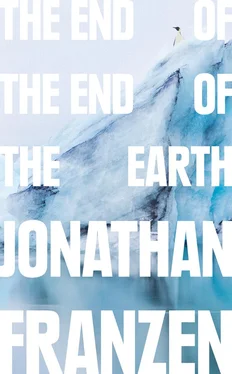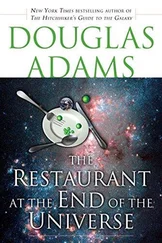A little tragicomedy of climate activism is its shifting of goalposts. Ten years ago, we were told that we had ten years to take the kind of drastic actions needed to prevent global temperatures from rising more than two degrees Celsius in this century. Today we hear, from some of the very same activists, that we still have ten years . In reality, our actions now would need to be even more drastic than they would have ten years ago, because further gigatons of carbon have accumulated in the atmosphere. At the rate we’re going, we’ll use up our entire emissions allowance for the century before we’re even halfway through it. Meanwhile, the actions that many governments now propose are less drastic than what they proposed ten years ago.
A book that does justice to the full tragedy and weird comedy of climate change is Reason in a Dark Time , by the philosopher Dale Jamieson. Ordinarily, I avoid books on the subject, but a friend recommended it to me last summer, and I was intrigued by its subtitle, “Why the Struggle Against Climate Change Failed—and What It Means for Our Future.” I was intrigued by the word failed in particular, the past tense of it. I started reading and couldn’t stop.
Jamieson, an observer and participant at climate conferences since the early nineties, begins with an overview of humanity’s response to the largest collective-action problem it has ever faced. In the twenty-three years since the Rio Earth Summit, at which hopes for a global agreement ran high, not only have carbon emissions not decreased; they’ve increased steeply. In Copenhagen, in 2009, President Obama was merely ratifying a fait accompli when he declined to commit the United States to binding targets for reductions. Unlike Bill Clinton, Obama was frank about how much action the American political system could deliver on climate change: none. Without the United States, which is the world’s second-largest emitter of greenhouse gases, a global agreement isn’t global, and other countries have little incentive to sign it. Basically, America has veto power, and we’ve exercised it again and again.
The reason the American political system can’t deliver action isn’t simply that fossil-fuel corporations sponsor denialists and buy elections, as many progressives suppose. Even for people who accept the fact of global warming, the problem can be framed in many different ways—a crisis in global governance, a market failure, a technological challenge, a matter of social justice, and so on—each of which argues for a different expensive solution. A problem like this (a “wicked problem” is the technical term) will frustrate almost any country, and it’s particularly difficult to solve in the United States, where government is designed to be both weak and responsive to its citizens. Unlike the progressives who see a democracy perverted by moneyed interests, Jamieson suggests that America’s inaction on climate change is the result of democracy. A good democracy, after all, acts in the interests of its citizens, and it’s precisely the citizens of the major carbon-emitting democracies who benefit from cheap gasoline and global trade, while the main costs of our polluting are borne by those who have no vote: poorer countries, future generations, other species. The American electorate, in other words, is rationally self-interested. According to a survey cited by Jamieson, more than sixty percent of Americans believe that climate change will harm other species and future generations, while only thirty-two percent believe that it will harm them personally.
Shouldn’t our responsibility to other people, both living and not yet born, compel us to take radical action on climate change? The problem here is that it makes no difference to the climate whether any individual, myself included, drives to work or rides a bike. The scale of greenhouse-gas emissions is so vast, the mechanisms by which these emissions affect the climate so nonlinear, and the effects so widely dispersed in time and space, that no specific instance of harm could ever be traced back to my 0.0000001% contribution to emissions. I may abstractly fault myself for emitting way more than the global per capita average. But if I calculate the average annual carbon quota required to limit global warming to two degrees this century, I find that simply maintaining a typical American single-family home exceeds it in two weeks. Absent any indication of direct harm, what makes intuitive moral sense is to live the life I was given, be a good citizen, be kind to the people near me, and conserve as well as I reasonably can.
Jamieson’s larger contention is that climate change is different in category from any other problem the world has ever faced. For one thing, it deeply confuses the human brain, which evolved to focus on the present, not the far future, and on readily perceivable movements, not slow and probabilistic developments. (When Jamieson notes that “against the background of a warming world, a winter that would not have been seen as anomalous in the past is viewed as unusually cold, thus as evidence that a warming is not occurring,” you don’t know whether to laugh or to cry for our brains.) The great hope of the Enlightenment—that human rationality would enable us to transcend our evolutionary limitations—has taken a beating from wars and genocides, but only now, on the problem of climate change, has it foundered altogether.
I’d expected to be depressed by Reason in a Dark Time , but I wasn’t. Part of what’s mesmerizing about climate change is its vastness across both space and time. Jamieson, by elucidating our past failures and casting doubt on whether we’ll ever do any better, situates it within a humanely scaled context. “We are constantly told that we stand at a unique moment in human history and that this is the last chance to make a difference,” he writes in his introduction. “But every point in human history is unique, and it is always the last chance to make some particular difference.”
This was the context in which the word nothing , applied to the particular difference that some Minnesotan bird lovers were trying to make, so upset me. It’s not that we shouldn’t care whether global temperatures rise two degrees or six this century, or whether the oceans rise twenty inches or twenty feet; the differences matter immensely. Nor should we fault any promising effort, by foundations or NGOs or governments, to mitigate global warming or adapt to it. The question is whether everyone who cares about the environment is obliged to make climate the overriding priority. Does it make any practical or moral sense, when the lives and the livelihoods of millions of people are at risk, to care about a few thousand warblers colliding with a stadium?
To answer the question, it’s important to acknowledge that drastic planetary overheating is a done deal. Even in the nations most threatened by flooding or drought, even in the countries most virtuously committed to alternative energy sources, no head of state has ever made a commitment to leaving any carbon in the ground. Without such a commitment, “alternative” merely means “additional”—postponement of human catastrophe, not prevention. The Earth as we now know it resembles a patient with bad cancer. We can choose to treat it with disfiguring aggression, damming every river and blighting every landscape with biofuel agriculture, solar farms, and wind turbines, to buy some extra years of moderated warming. Or we can adopt a course of treatment that permits a higher quality of life, still fighting the disease but protecting the areas where wild animals and plants are hanging on, at the cost of slightly hastening the human catastrophe. One advantage of the latter approach is that, if a miracle cure like fusion energy should come along, or if global consumption rates and population should ever decline, there might still be some intact ecosystems to save.
Читать дальше












